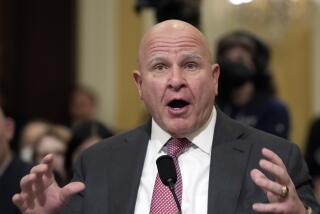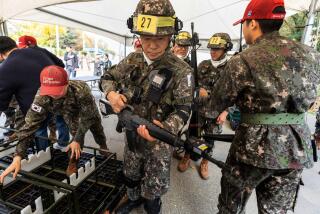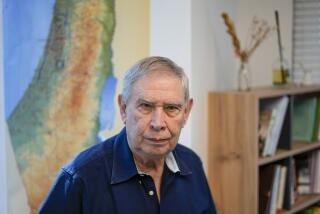Ex-Baathists Offer U.S. Advice, Await Call to Arms
- Share via
BAGHDAD — The phone is dusty, the fan is weak, and the banished soldiers -- a bit paunchier and a step slower these days -- wait for a call to join the new Iraqi army. They drink strong coffee from the same cup and talk about withered pride and wonder why no one’s swooning anymore over their medals and ribbons.
“Our country needs us back,” said Raheem Naim Hwaim, an ex-colonel who served in Saddam Hussein’s army for 24 years. “Every Iraqi sees what’s happening out there, and your blood boils that you can’t do something to make things better. You feel powerless.”
Hwaim and the other men sitting in the beige brick headquarters of the Free Officers and Civilians Movement were fired from the army last year when the U.S. purged members of Hussein’s Baath Party from positions of influence. That policy, which angered the middle class and stripped the government of professionals, proved hasty. Now U.S. officials are inviting majors, colonels and generals to reapply for their old jobs.
The de-Baathification policy indicated how little Washington understood of the dynamics of Iraqi politics, the soldiers said. To succeed in Iraq -- as a teacher, military officer or plumber -- one had to belong to the party. Yet millions of Baathists despised the organization. Unlike Hussein’s inner circle, most party members weren’t ideologues and their allegiance was a necessary lie to survive a dictatorship.
“The U.S. made a mistake in firing Baathists from the military,” said Abdul-Raheem Thamir, a colonel and battalion commander in the old army. “Are all Baathists criminals? I had to be in the Baath Party or I’d lose my military post. What would you have done? Eighty-five to 90% of all Baathists belonged to the party just to put bread on the table.”
Many Baathists, however, did prosper from Hussein’s tyranny. Hundreds tortured, robbed and instigated fear in villages and cities. Their diminishment is widely seen as crucial to the nation’s healing.
U.S. officials announced last week that Baath Party members “with no blood on their hands” have a place in the new Iraq. Dan Senor, the chief U.S. civilian spokesman in Iraq, said former Baathist high-ranking military officers are needed because “you cannot pull generals out of thin air” when building a military organization.
The new Iraqi army is sequestered in the desert, and the deployment of some of its forces this month disappointed American officials. A U.S.-trained battalion of 620 Iraqi soldiers refused to join American Marines fighting insurgents in Fallouja. The soldiers said they didn’t want to fight fellow Iraqis -- a troubling sign that U.S. officials said indicated a lack of leadership.
“The Americans have neglected and marginalized us,” said former Brig. Gen. Adnan Izzat, who as a tank commander in Tikrit had battled U.S. forces until planes dropped 500-pound bombs around him. “We wanted to help Americans after the war, but they dissolved our glorious army and now they are facing problems.”
The guys at the Free Officers headquarters -- founded by out-of-work soldiers after last year’s invasion -- sit on couches and chairs, sharing a couple of newspapers and waiting for the long-spouted coffeepot to make its rounds.
Most have gray-flecked hair and children at home. They fought in Kuwait, but many did not march their men into battle last year against American forces. They wanted to believe Hussein’s vision was pure, but they knew otherwise and didn’t want to be destroyed for a misguided whim.
It was hard, they said, to be a false hero in one war and a deserter in another.
“We are professional men,” said Ayad Bardi, once a lieutenant colonel. “The first thing we think about is to serve our country. The military was isolated from Saddam Hussein politics. The proof is we didn’t fight in last year’s war. We can never be accused of this.”
The sage of the room was Abdul Qader Mohammed Jasim, a former brigadier general with combed-over hair and a string of worry beads. He was commander of the Iraqi Armored Corps and director of the old Armored Training Institute in Tikrit.
He taught most of the officers in the room before running afoul of Hussein in the mid-1990s with his opinion that U.S. tanks were superior to Iraqi ones. He spent 14 months and 13 days in prison and was released in 1995 under a general amnesty.
After the U.S.-led invasion last year, he helped American military and intelligence officials understand the structure of the Iraqi army. These days, he is angry at the Americans.
He said U.S. officials believed “outsiders” who told them Jasim was a Baath Party loyalist. These “outsiders” are adding their voices to Iraq’s vicious political atmosphere. It is defined by the passions of those who suffered under Hussein and those who fled the country, most notably Ahmad Chalabi, who has returned with his Iraqi National Congress.
Chalabi, a Shiite Muslim, is against members of the Sunni Muslim-dominated Baath Party regaining their jobs, saying it would be tantamount to giving power back to Nazis after World War II. Instead, Chalabi wants to open up opportunities for Shiites.
The former officers say the U.S. is caught between the political complexities of unfair de-Baathification and Iraq’s desire to move beyond Hussein’s legacy. Because they’re out of work and have a lot of time to ponder things, the former army men have a few suggestions for their American counterparts.
“The U.S. military leaders should stop appearing on TV in their uniforms,” Jasim said. “Iraqis are bored and suspicious of seeing militarily clad men. Hussein and his people appeared on TV all the time in military uniforms and nobody liked them. I’d like to see politicians in suits on TV so I’d know we were getting political solutions instead of military ones.”
The application to rejoin the Iraqi armed forces is a few pages long. It asks for name, rank, education and achievements. The officers dutifully fill the papers out, fastening their pictures to them with straight pins. Jasim peruses them.
The applications will be delivered to the old airport, where members of the Iraqi Defense Ministry and American officials will determine how much of a Baathist each former officer was.
“I am a lieutenant colonel,” said Bardi, a compact man with a scratchy cigarette voice. “When I presented my papers to the Americans, they said they couldn’t guarantee that I would stay a lieutenant colonel. I may go to a lower rank.
“This is taking away my pride. They also made high-ranking officers stand in line in the sun with lower soldiers. This is not right.”
But Bardi and the others said they would endure such indignities if they were invited back. Some have already returned; 70% of the new army is made up of Hussein-era soldiers.
“If the Iraqi military were in control instead of the Americans we would not have the problems we’re having in Fallouja,” Bardi said.
“We would have solved it diplomatically. We know the culture. We know the sensitivities of entering someone’s home and of searching women. The Americans don’t understand this.”
It was close to lunchtime. Jasim sat with a newspaper. Other officers turned their backs to the sunlight slanting through the windows. The fan creaked. The coffee was finished. The phone on the desk was quiet.
“The U.S. military should stay here no longer than two to three years,” Thamir said. “They should teach us about the Western-style army. They should teach us about ethics and help us with weapons. But they should retract from Iraqi society to their bases. They should let the Iraqi military take over.”
More to Read
Sign up for Essential California
The most important California stories and recommendations in your inbox every morning.
You may occasionally receive promotional content from the Los Angeles Times.














